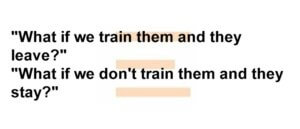 I read a re-published article titled Working From Home Vs. Working At The Office: Who Gets More Done? by
I read a re-published article titled Working From Home Vs. Working At The Office: Who Gets More Done? by
Nate Hindman. The article was published on the Small Business blog of an insurer, The Hartford.
Of interest to me – a proponent of working remotely – was the comparison section, accompanying data, and the conclusion (which I share here):
Lister notes that when determining the efficacy of remote vs. in-office employees the culture of a team is as important as the work itself.
“If a team doesn’t know each other that well, it is far better to work face to face,” she says. In-person interaction “gives people the time to build social connections that make it easier to collaborate remotely and create that level of trust to be effective when they’re not in the same room.”
The salient points?
- Culture matters
- Rapport counts
Culture Matters
You can have the best people. They can be intelligent, talented individuals who know how to play nice with others. But if your culture is oppressive, their endeavors will fail.
Since I know and work with talented technologists I see this time and time again. Tip to employers:
If you want to keep top talent, you cannot pay them enough to put up with your crap. You have to stop the crap.
If you, as an employer, want to practice handing out participation trophies, you need to engage in a neighborhood sports league. People who are self-motivated enough to seek the knowledge they need – and wise enough to then apply that knowledge in creative, innovative ways – are demotivated by the recognition of “everyone as equal.”
But there’s a flip side: These same individuals are also not motivated by applause at the team meeting, Employee of the Month parking spots, or Starbucks gift cards.
I can hear you thinking, “So how do I motivate my top performers, Andy?”
I’m glad you asked,
Training.
That’s it. Training. Send them to training. They’ve self-identified as people who like to learn. Do you have a top shelf developer interested in cloud technology? Send her to Reinvent or Build. Save your Starbucks gift card money and allow someone else to park closer to the building. Send your top performers to more training.
I have been told thrice in the past six weeks about great people who left their last job or are about to leave their current job because their employer killed the training budget. Is training expensive? Yes. But not as expansive as finding a new employee – let alone a new top performer.

Employers, please do the math.
Rapport Counts
At Enterprise Data & Analytics, we often consult remotely, but we insist on starting projects face-to-face. Why? See the quote from the article above. Email is extremely subject to interpretation. People who don’t know me may misinterpret what I write in an email – unless they’ve had an opportunity to get to know me. there’s no substitute for building rapport. There’s no other way to build trust. Both trust and rapport are best built face-to-face.
A little-known fact: poor rapport with the customer team is the number one project killer. I and my team cannot be successful if we are unsuccessful at working with your team. Fortunately, I and my team are fun to work with! We are not prima donna’s, we learned because other people shared with us and one of the things we learned from the people who shared with us is: We should share with others. We love learning! I think that’s why we love sharing and helping others learn.
Customers are often shocked that I consult. I have a great team working with me but yep, I still show up and deliver. I think folks get the impression that someone who’s authored / co-authored a dozen books just isn’t accessible. Nothing could be further from the truth!
I help people every day!
In addition to public training with Brent Ozar Unlimited and SQLSkills, I deliver customized private training to companies on-demand.
I and my team deliver data integration solutions for customers, and we bring value when we do. (The post linked in the last sentence is worth the read. The short version is: Expensive developers are not as expensive as they appear.)
How may we serve you? Let us know!
Conclusion
- Be a dependable adult. This isn’t about age. It’s about maturity. Penny Trupe is a millennial and she’s a rocking consultant at Enterprise Data & Analytics.
- Share knowledge if you have it, seek out a mentor if you need to learn. (Pro tip: we all have something to share and something to learn.)
- Work hard and work smart. For more information, see Grant Cardone’s books The 10X Rule and Be Obsessed or Be Average. A tip o’ the hat to my Data Driven Podcast co-host and brother from another mother, Frank La Vigne (blog | @Tableteer), for turning me on to Grant.
:{>

Comments